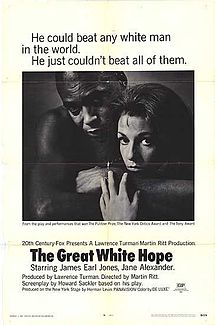
THE GREAT WHITE HOPE
US, 1970, 102 minutes, Colour.
James Earl Jones, Jane Alexander, Lou Gilbert, Robert Webber, Hal Holbrook, Beah Richards.
Directed by Martin Ritt.
The Great White Hope was the name for the American chosen to fight heavyweight champion Jack Johnson early in the 20th century. Howard Sackler adapted his Pulitzer prize-winning play for the screen ("much of it based on fact"), and Martin Ritt (noted for his excellent dramas with their social consciousness, Hud, Hombre, The Molly Maguires) directed.
The film seems a bit flat; perhaps it is the stage origin. James Earl Jones comes across magnificently (nominated for the Oscar 1970) but one realises his continual stage presence (no crowds, no wide screen) must have been even more impressive. Jane Alexander, also nominated for an Oscar, is excellent.
The atmosphere and mood of the times is presented well in a way that the play could not. But the effect of the whole film is saddening, a pessimistic study of victimised human beings and racial arrogance.
1. What kind of tone was set for the film in the sequence where the fight promoters sought out the Great White Hope to fight Jefferson? How cynical was the scene? What did it say about race relations, jealousy, greed and exploitation? Did the tone of the film change at all?
2. What was your first impression of Johnson? His fighting abilities, ambition, feelings, sense of humour, love for his white girl-friend (especially in contrast with his former black girl-friend)?
3. What kind of character was Eleanor? Did she really love Jack? Was she selfish in her love?
4. Did you get a feeling for the times from the film, especially from the reporters and the Reno fight, the cheers for the Hope and the jeers and derision for Jack? The black celebration of his victory?
5. Comment on Jack's reactions to the white hatred (humour and smile) and to the black group (contempt for their continuation of racism). Why were the plots of the District Attorney and interview with Eleanor disgusting?
6. Why was Jack victimised - as black, champion, loving a white woman?
7. Should Jefferson have been allowed into England?
8. Why did Paris show his professional and personal decline in the fight?
9. Why did Jack and Eleanor clash in the Paris gardens?
10. Were you shocked at their Hungarian performance? Why was it ironical that they should do Uncle Tom's Cabin?
11. Why did Jack's manager go along with the American authorities' scheme for a match with Jack losing?
12. Why was the squalor in Mexico too much for Eleanor to take? Why was Jack cruel to her? What was the effect of her death on him?
13. Havana - comment on the crowd's reactions. Why did Jack decide to show his capacities so late in the fight?
14. Why was his defeat not only a complete humiliation, but victimisation?
15. Was the film pessimistic? Did it have any hope? Could you tell the film was based on a play? Did you notice that there were no lengthy fight sequences until Havana? Why?
16. Do you think the film contributed to your understanding of the American black-white problem?